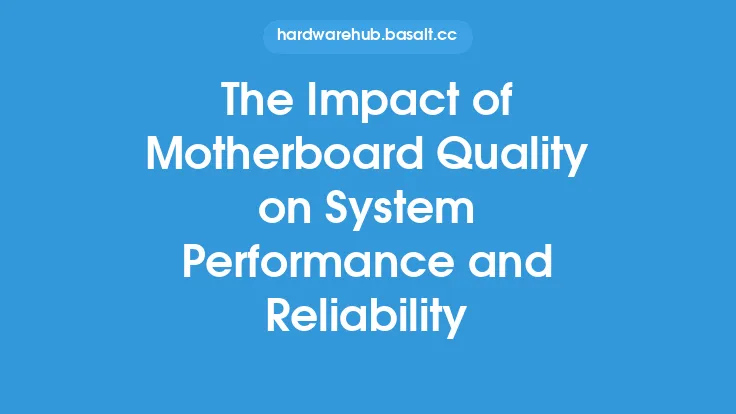When it comes to building or upgrading a computer, one of the most critical components to consider is the power supply unit (PSU). The PSU is responsible for converting Alternating Current (AC) power from the mains to Direct Current (DC) power that the computer's components can use. One key aspect of a PSU's performance is its efficiency, which can have a significant impact on the overall performance and reliability of the computer. In this article, we will delve into the details of power supply efficiency and its effects on computer performance and reliability.
What is Power Supply Efficiency?
Power supply efficiency refers to the ability of a PSU to convert AC power to DC power with minimal loss of energy. This is typically measured by the PSU's efficiency rating, which is expressed as a percentage. For example, an 80% efficient PSU will convert 80% of the AC power it receives into usable DC power, while the remaining 20% is lost as heat. The most common efficiency ratings for PSUs are 80 PLUS Bronze, Silver, Gold, Platinum, and Titanium, which correspond to efficiency ratings of 82%, 85%, 90%, 92%, and 94%, respectively.
How Does Power Supply Efficiency Affect Computer Performance?
A PSU's efficiency can have a significant impact on computer performance. A high-efficiency PSU can provide several benefits, including:
- Reduced heat generation: High-efficiency PSUs generate less heat, which can help to reduce the overall temperature of the computer and improve its reliability.
- Increased power delivery: High-efficiency PSUs can deliver more power to the computer's components, which can improve performance and reduce the risk of power-related issues.
- Improved voltage regulation: High-efficiency PSUs typically have better voltage regulation, which can help to ensure that the computer's components receive a stable and consistent power supply.
- Reduced noise: High-efficiency PSUs often have lower noise levels, which can improve the overall user experience.
The Impact of Power Supply Efficiency on Reliability
A PSU's efficiency can also have a significant impact on the reliability of the computer. A low-efficiency PSU can generate excessive heat, which can cause components to fail prematurely. Additionally, a low-efficiency PSU may not be able to deliver enough power to the computer's components, which can cause system crashes and other issues. On the other hand, a high-efficiency PSU can help to improve the reliability of the computer by:
- Reducing the risk of overheating: High-efficiency PSUs generate less heat, which can help to reduce the risk of overheating and improve the overall reliability of the computer.
- Improving power delivery: High-efficiency PSUs can deliver more power to the computer's components, which can help to reduce the risk of power-related issues and improve overall reliability.
- Reducing the risk of electrical stress: High-efficiency PSUs typically have better voltage regulation, which can help to reduce the risk of electrical stress and improve the overall reliability of the computer.
Technical Aspects of Power Supply Efficiency
From a technical perspective, power supply efficiency is determined by several factors, including:
- Switching frequency: The switching frequency of a PSU refers to the rate at which the PSU switches on and off to regulate the output voltage. A higher switching frequency can help to improve efficiency, but it can also increase the risk of electrical noise and other issues.
- Topology: The topology of a PSU refers to the design of the PSU's circuitry. Common topologies include linear, switch-mode, and resonant. Each topology has its own strengths and weaknesses, and the choice of topology can have a significant impact on efficiency.
- Component selection: The selection of components, such as capacitors, inductors, and MOSFETs, can also have a significant impact on efficiency. High-quality components can help to improve efficiency, while low-quality components can reduce it.
- Cooling system: The cooling system of a PSU can also have a significant impact on efficiency. A well-designed cooling system can help to reduce the temperature of the PSU, which can improve efficiency and reduce the risk of overheating.
Real-World Implications of Power Supply Efficiency
In real-world scenarios, the implications of power supply efficiency can be significant. For example:
- Data centers: In data centers, power supply efficiency can have a major impact on energy consumption and heat generation. High-efficiency PSUs can help to reduce energy consumption and improve the overall reliability of the data center.
- Gaming computers: In gaming computers, power supply efficiency can have a significant impact on performance. High-efficiency PSUs can help to deliver more power to the computer's components, which can improve performance and reduce the risk of power-related issues.
- Home offices: In home offices, power supply efficiency can have a significant impact on energy consumption and heat generation. High-efficiency PSUs can help to reduce energy consumption and improve the overall reliability of the computer.
Conclusion
In conclusion, power supply efficiency is a critical aspect of computer performance and reliability. A high-efficiency PSU can provide several benefits, including reduced heat generation, increased power delivery, and improved voltage regulation. On the other hand, a low-efficiency PSU can generate excessive heat, reduce power delivery, and increase the risk of electrical stress. By understanding the technical aspects of power supply efficiency and its real-world implications, users can make informed decisions when selecting a PSU for their computer. Whether you're building a gaming computer, a home office, or a data center, a high-efficiency PSU is essential for optimal performance and reliability.





